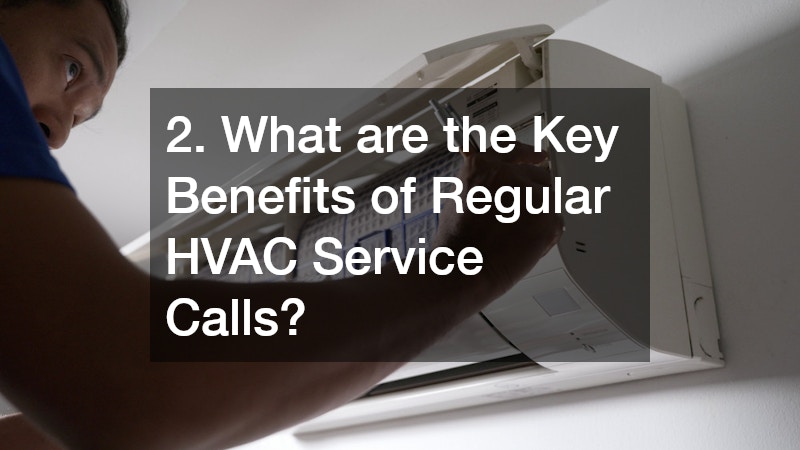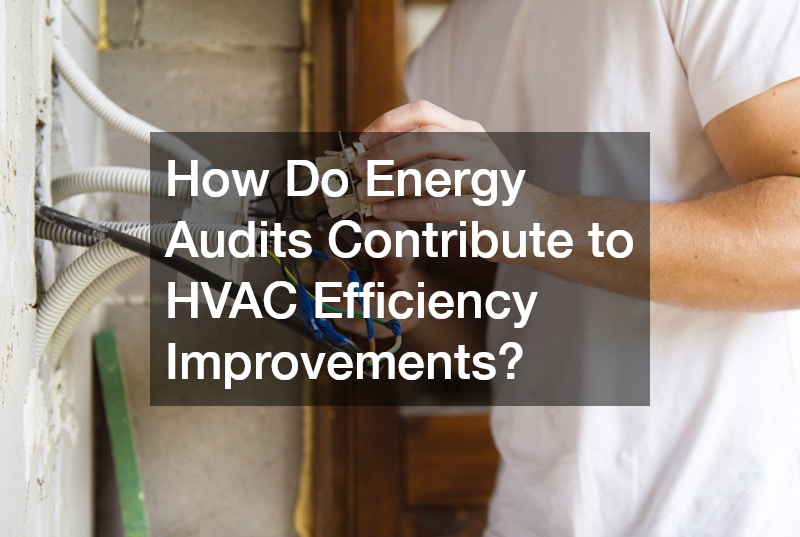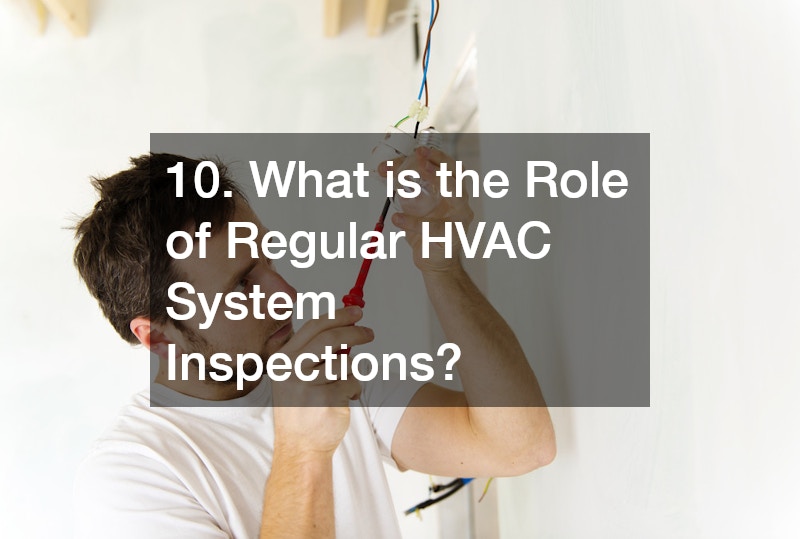HVAC systems are integral to maintaining comfortable indoor environments, ensuring air quality, and contributing to a building’s energy efficiency. These systems are not only pivotal for comfort but also have a significant environmental impact due to their energy consumption patterns. Improving HVAC efficiency can lead to considerable cost savings and reduced emissions, making it a critical objective for building managers and owners.
Migrating to more efficient HVAC systems helps combat the negative environmental effects of energy consumption. Consequently, optimizing these systems through regular maintenance, strategic upgrades, and systematic improvements contributes to sustainable building practices. The following sections explore some actionable insights on maximizing HVAC efficiency for enhanced building performance.
This comprehensive guide delves into various aspects of HVAC efficiency improvement, from regular service calls to upgrading components. By understanding and implementing these strategies, businesses and property owners can achieve more energy-efficient and environmentally responsible operations.
1. How Often Should You Schedule HVAC Service Calls?
Regular HVAC service calls are essential to keep your system in top operating condition. Generally, it is recommended to schedule such checks at least twice a year—preferably at the start of the heating and cooling seasons. Consistent service allows technicians to catch small issues before they become large problems, potentially saving on costly repairs.
Emergency services for mechanical contracting can address unforeseen breakdowns, but regular maintenance should minimize the need for such responses. Service calls should include checking for signs of wear, calibrating controls, and ensuring all components, such as VRF system installations, are functioning correctly. This vigilance ensures the HVAC system runs efficiently throughout its lifespan.
Moreover, reliable HVAC service calls can help prolong the life of the system by maintaining optimal performance and efficiency. Enlisting the help of local electricians during maintenance tasks can also be beneficial, as they may assist with electrical assessments and repairs as needed. These proactive measures are integral for maintaining system integrity and energy efficiency over time.
2. What are the Key Benefits of Regular HVAC Service Calls?

The primary benefit of regular HVAC service calls is the maintenance of high efficiency levels within the system. When performed consistently, these services ensure that each component is performing optimally, which can significantly reduce energy consumption. This not only cuts costs but also supports environmentally friendly practices by reducing energy waste.
A welcome benefit of routine maintenance is reduced likelihood of unexpected breakdowns, which can lead to costly repairs or replacements. Regular checks, especially on complex systems like VRF system installations, help prolong the equipment’s lifespan and maintain its efficiency. Regular servicing means resolving issues before they escalate, ensuring smooth and continuous operation.
Furthermore, these service calls enhance air quality by ensuring that systems are clean and filters are replaced on time. Keeping air ducts free from clogs and obstructions can prevent pollutants from circulating throughout the building. Ultimately, regular maintenance is an investment in the system’s long-term efficiency and reliability, providing peace of mind for building managers.
3. How Can Upgrading to a Smart Thermostat Improve Efficiency?
Adopting modern technology, such as smart thermostats, is a powerful way to improve HVAC system efficiency. These devices provide advanced control over HVAC settings, allowing for precise temperature adjustments based on occupancy and time. Through the use of integrated sensors and analytics, smart thermostats can learn patterns and adjust settings automatically, thus optimizing energy usage.
By enlisting local electricians to install these devices, property owners can ensure proper setup for maximum efficiency. Smart thermostats offer not only convenience but also energy savings by preventing excessive heating or cooling. The financial savings from reduced energy consumption serve as a reward for technological investment.
The incorporation of smart thermostats can also aid in predictive maintenance by alerting users to potential system issues before they become critical. This proactive approach ties into the importance of regular HVAC service calls, showcasing how technological advancements complement traditional maintenance practices. Integrating smart systems with existing HVAC setups can significantly contribute to improved efficiency and sustainability.
4. What Role Do Air Ducts Play in HVAC Efficiency?
Air ducts are crucial for distributing heated or cooled air throughout a building, and their condition can hugely impact HVAC efficiency. Clean, sealed, and well-maintained ductwork ensures that energy is not lost and that air quality is high. Adequate wire seal techniques are necessary to eliminate leaks, minimize energy wastage, and maximize system output.
Regular HVAC service calls should include assessments of the duct system. Professionals can identify and address any leaks or blockages that may be affecting performance. Proper duct maintenance enhances efficiency, as even minor leaks can lead to significant energy losses over time.
A well-maintained duct system also helps improve indoor air quality, as it prevents contaminants from circulating within the building. Utilizing fluid equipment repair services for comprehensive system evaluations can ensure ducts and related HVAC components operate efficiently. A proactive approach to ductwork maintenance ultimately supports overall HVAC system functionality.
5. How Does Air Filter Replacement Affect HVAC Performance?

Air filters play a decisive role in maintaining the efficiency and air quality of an HVAC system. Clogged or dirty filters can obstruct airflow, forcing the system to work harder and thus consuming more energy. Regular filter replacement is a simple yet crucial aspect of HVAC maintenance, contributing to optimal system performance and energy efficiency.
Engaging in routine HVAC service calls affords the opportunity to check and replace air filters as needed. This maintenance task supports effective airflow, promotes better indoor air quality, and prevents unnecessary strain on system components. Consistent air filter replacements can extend system life by reducing wear on mechanical parts.
Working with professionals who specialize in fluid equipment repair can ensure the proper handling of filters and other HVAC components. This attention to detail not only aids in maintaining the system’s efficiency but also protects against pollutants that can compromise health and safety within the building. Thus, air filter management is a fundamental aspect of enhancing HVAC systems.
6. What Are the Advantages of Zoned HVAC Systems?
Zoned HVAC systems provide targeted temperature control, enabling different areas of a building to be heated or cooled independently. This customization enhances comfort and reduces energy waste by allowing occupants to set specific temperatures for different zones. This targeted control can significantly enhance system efficiency and is often achieved through sophisticated setups like a gas blending system.
The benefits of zoned HVAC systems are numerous; they promote energy savings by only heating or cooling areas currently in use. This precision leads to heightened efficiency and reduced costs, which, in turn, contributes to lower environmental impact. Additionally, zoned systems can better accommodate occupancy variations, providing tailored climate control in large or multi-use spaces.
Zoned systems also contribute to better system longevity and less frequent need for HVAC service calls by minimizing the workload on individual components. By implementing such systems, building managers can enjoy greater flexibility and efficiency, addressing the unique needs of their environments. With careful planning and execution, zoned systems represent a significant step forward in HVAC innovation.
7. How Do Energy Audits Contribute to HVAC Efficiency Improvements?

Conducting energy audits helps identify areas where a building’s energy use can be optimized, including HVAC systems. These audits offer detailed insights into efficiency levels, highlighting opportunities for improvement and informing regular HVAC service calls. With this data in hand, building managers can implement targeted improvements to enhance system performance.
Energy audits, as conducted by experts in fields like electric generator rebuild, shine a spotlight on inefficiencies and performance shortfalls that may otherwise go unnoticed. They provide a roadmap for making informed and impactful upgrades, focusing on reducing energy consumption and associated costs. By identifying and rectifying inefficiencies, energy audits directly contribute to the sustained efficiency of HVAC systems.
Furthermore, energy audits can uncover insights into the interactions between HVAC efficiency and other building systems. Taking a holistic view of energy use allows for more comprehensive strategies, ultimately leading to a more sustainable and environmentally friendly facility. When implemented wisely, the insights from energy audits are invaluable for long-term efficiency improvements across various building systems.
8. What Impact Does HVAC System Sizing Have on Efficiency?
Proper HVAC system sizing is vital to achieving operational efficiency. A system that is too large will cycle on and off frequently, leading to increased energy consumption and wear. Conversely, an undersized system may struggle to meet demand, resulting in continuous operation and high energy costs.
The inclusion of HVAC service calls in routine maintenance schedules allows for effective evaluation of system efficiency relative to demand. Experts can provide recommendations for system adjustments or replacements to optimize performance. Proper system sizing ensures that climate control is delivered efficiently, thereby reducing unnecessary energy expenditures and costs.
Integrating factors such as drain field installation into system evaluations ensures sizing appropriateness with minimal environmental impact. Properly sized systems not only reduce costs and energy use but also ensure long-term reliability and performance. By focusing on these critical aspects, building managers can achieve optimal energy efficiency and system longevity.
9. How Can the Use of Renewable Energy Sources Enhance HVAC Systems?
The introduction of renewable energy sources, such as solar or geothermal, into HVAC systems can dramatically reduce energy dependence. These sustainable sources offer endless opportunities for enhancing system efficiency while reducing the environmental footprint. By utilizing renewables, buildings can set the standard for modern, eco-friendly design practices.
Incorporating renewable energy requires expert input from local welders and other specialists to ensure integration into existing systems. This collaboration leads to seamless operations and substantial cost savings over time. Renewable energy adoption within HVAC systems offers a double benefit of reducing utility bills and aligning technology with sustainability goals.
The integration of renewable energy sources represents a significant advancement in enhancing the efficiency of Heating, Ventilation, and Air Conditioning (HVAC) systems. This is achieved through the synergistic pairing of sophisticated, cutting-edge technologies with proactive and well-defined conservation strategies. Highly skilled professionals, including those possessing extensive knowledge and practical experience in addressing a wide range of HVAC service calls, play a crucial role in ensuring that these advanced installations are executed and maintained in a manner that maximizes both operational efficiency and long-term environmental sustainability. The intelligent synthesis of renewable energy generation and thoughtfully implemented energy-efficient design principles is fundamentally redefining the performance capabilities and environmental impact of modern HVAC systems, paving the way for more sustainable and cost-effective climate control solutions in residential, commercial, and industrial applications.
10. What is the Role of Regular HVAC System Inspections?

Regular HVAC system inspections are a cornerstone for identifying and addressing potential problems before they escalate. These comprehensive checks include assessments of all system components, ensuring optimal performance and energy efficiency. Integrated inspections also promote a safe and healthy environment conducive to productivity and comfort.
Relying on expert inspectors, such as a roofer who specializes in HVAC systems, can greatly enhance the effectiveness of regular evaluations. System inspections focus on spotting signs of wear and tear, leaks, or other malfunctions that could impair performance. Regular assessments, when made a priority, ensure that systems remain in excellent condition and continue to meet specified efficiency standards.
Through consistent HVAC service calls and inspections, the risk of major failures is substantially reduced, safeguarding the investment in system infrastructure. Professionals can provide targeted maintenance and insights to further improve system longevity. These routine practices fortify HVAC systems against inefficiencies, providing long-term value and reliability to building managers and occupants alike.
To achieve optimal building performance, consistent attention to HVAC efficiency is imperative. Whether through regular HVAC service calls or strategic system enhancements, maintaining high operational standards is crucial. The insights offered in this guide help building managers to optimize their systems while embracing sustainability principles.
Honing in on detail-oriented maintenance and operational strategies, such as vrf system installations and air filter management, significantly impacts both energy consumption and system longevity. The commitment to environment-conscious practice not only supports a healthier planet but also yields significant cost savings over time.
Incorporating advancements in technology, including smart thermostats and renewable energy sources, complements traditional efficiency techniques. This comprehensive approach ensures that HVAC systems perform seamlessly, maintaining high efficiency levels and sustainability – hallmarks of modern building management.
